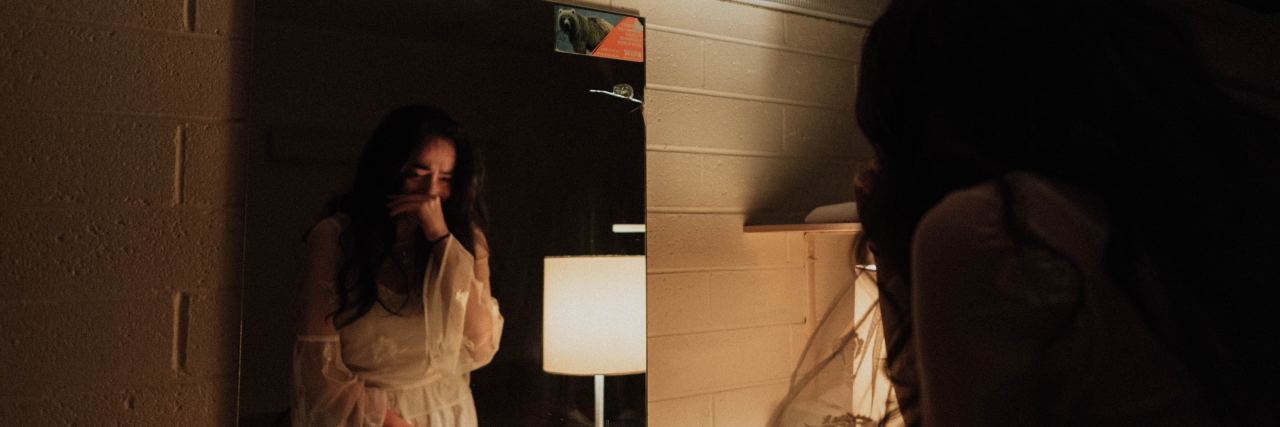How Childhood Abuse Delayed My Endometriosis Diagnosis
“You’re not allowed to be sick.”
“Pain is good for you.”
“I’m so tired of hearing you complain.”
“You’re sick again?!”
“There’s always something wrong with you.”
Phrases I heard regularly in my early childhood, accompanied by mocking and ridicule.
As a poorly child, I had a long list of health problems that I never seemed to “grow out of.”
Whenever I’d express that I didn’t feel well, or I was in pain, or something was wrong, it was met with derision, sarcasm, or straight dismissal. One needs prior “permission” to be sick, apparently. And I wasn’t given that.
I learned early on that sharing my health problems was not a viable option. Over time, I became quite the master at hiding how ill I was and just powering through it to spare myself the repercussions of exposing it.
As I reached puberty and began menstruating, things took a turn for the worse. A lot worse. I didn’t know it at the time, but I was struggling with endometriosis.
About a year to the month after starting, I experienced endometriosis pain for the first time. After stifling my ailments and struggling in silence, this was the most intense pain I’d ever felt and I was terrified. I had failed to talk myself out of this one. I risked the humiliation and inevitable insults to express my agony, that’s how I knew something was seriously wrong with my body. But I was of course dismissed, as I had anticipated. That was the first and last time I mentioned it.
Shaking. Sweating. Razorblades and glass slicing my pelvis. Sick from both ends. Horrific back pain. Pulling and ripping. Extreme bloating. Organs catching and scraping. Barbed wire around my waist. Muscle pain. Joint pain. Solid inflammation. Corrosive acid across my abdomen. Intense contractions radiating to my feet and down my arms.
At age 13, some quick Googling revealed that I was mostly likely dealing with endometriosis. And it was starting to affect me all month long because I just got sicker.
I told myself I couldn’t have endometriosis. These women were missing school and work, on prescription painkillers, and taking trips to the ER. I surely wasn’t in that category. Heck, I never even missed school once.
But growing up in a traumatic environment taught me that you can suppress anything to push through when necessary. Your body is an amazing, complex machine. It does what you either “allow” it to do or what you “need” it to do in times of survival, an adaptive quality of complex post-traumatic stress disorder.
I spent years convincing myself that I was a wimp because I couldn’t handle the pain. I held back screams during class and cried my pain into pillows because no one had given me “permission” to be this sick. Revealing it would only lead to further pain.
Once I left home and had to quit my job because my condition worsened, I knew it was time to investigate the diagnosis I suspected for over a decade.
It’s already so difficult to get an endometriosis diagnosis. How do you explain the extent of your pain to doctors when your survival for so many years has depended on hiding it? When you’ve been told your entire life that being sick is something you should apologize for? That it’s something you do on purpose to inconvenience others? That your pain doesn’t matter? That you don’t matter?
That’s the position I found myself in during the months leading up to my first excision laparoscopy. While my self-diagnosis was correct and my condition turned out to be quite severe, the process surely wasn’t easy. Perhaps one of the hardest things I’ve done yet on my healing journey.
I’m more of a writer than speaker, so writing detailed notes for my doctors, lots of inner work, and starting to talk about my health with others got me through. Surgery was a huge teaching experience. I’d be lying if I said that resolved my emotional blocks surrounding being ill. Since endometriosis is a chronic, incurable disease, that provides plenty more opportunities for me to learn and heal.
Being an endometriosis advocate by speaking out and sharing your experience can benefit yourself and others who are still seeking a diagnosis. Remember, your pain matters.
Photo by kevin laminto on Unsplash

